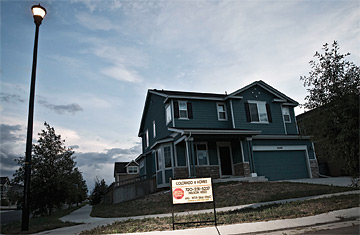
The boom in risky and subprime mortgages is finally catching up to neighborhoods like this one in Denver, where delinquencies, defaults and foreclosures are spiking.
(3 of 3)
Spreading The Risk
In decades past, the trouble would end with a borrower in default and a bank foreclosing on the home. But today few banks hold onto mortgages until they are paid off. Most loans are bundled together and sold as mortgage-backed securities. • Mortgage delinquency rate
• Source: Mortgage Bankers Association
Raising The Risk
The new owner of the mortgages can use them as collateral to issue bonds to finance other deals. Money from thousands of homeowners covers the interest payments on those bonds. To attract investors, the bonds are rated by risk groups, called tranches (the French word for slices). The more secure the bond, the lower the payoff for investors. Those who buy the riskiest pool of bonds - the ones backed by the riskiest home mortgages - are promised the highest return. • Mortgage-backed securities • Pool of mortgages • Bond tranches • Risky bonds re-rated in a CDO
Compounding The Risk
To further complicate the picture, some firms create new "structured finance" products, called collateralized debt obligations, from pieces of other mortgage securities. These new bonds are re-rated, creating illusion of safety even though the top-rated bonds may include very risky original loans. Last year nearly $500 billion in CDOs flooded the market. Many hedge funds invested heavily in them, often using borrowed money, and thus increasing their exposure. The Contagion
At its core, the entire process is based on using borrowed money (home mortgages) as collateral to borrow more money (mortgage-backed securities) to borrow yet more money (CDOs), and hoping the payment chain doesn't break. Once home-mortgage defaults rise, the whole system can unravel.
• Dow Jones industrial average
• Since Jan. 3 1 Without the payments from homeowners, the issuers can't pay off the bonds.
2 The bonds lose value, and the hedge funds that borrowed money to buy the bonds must put up more collateral or try to sell the bonds, which can cause their value to drop even more.
3 The rout begins. Banks tighten credit, raising the cost of financing corporate and private-equity deals. Other investors then want to reduce their risk. Stock prices fall, and bond prices rise. With global markets so closely linked, fear spreads rapidly around the globe.
4 Back on Main Street, tighter credit means fewer people getting home mortgages, further depressing the housing market and perpetuating the cycle.
